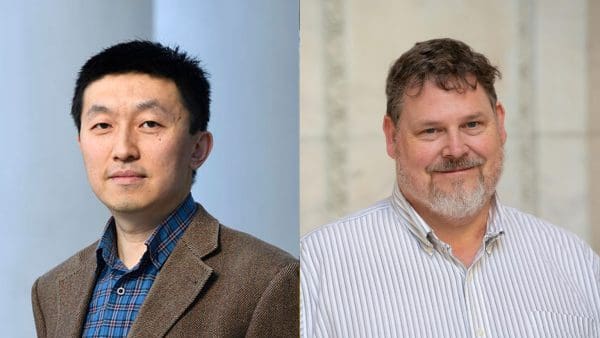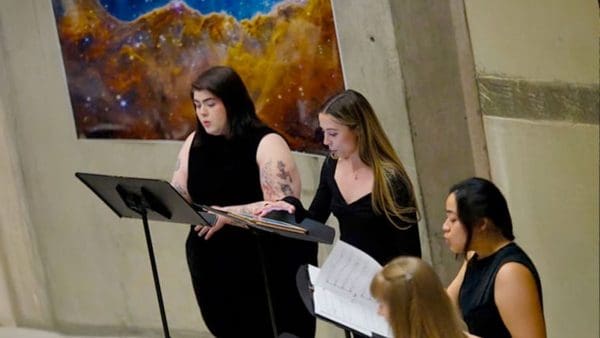
Richard A. Zdanis ’57, PhD ’60 (Physics), who served in the Johns Hopkins administration and as professor in the Department of Physics and Astronomy for many years, died May 5, 2019, of a stroke in Columbus, Ohio, where he lived. He was 83.
A Baltimore native, Zdanis spent two years at Princeton after earning his doctorate at Johns Hopkins. He returned to the Hopkins physics and astronomy department as assistant professor in 1962. Celebrated for his research on high-energy physics, he earned the rank of professor in 1969 and co-chaired the department’s high-energy group. He conducted early particle physics research at the National Laboratory at Brookhaven, Long Island, New York, and then moved to the newly completed Stanford Linear Accelerator Center (SLAC) in Palo Alto, California.
Zdanis also served as associate provost from 1975 to 1979; as vice president for administrative services from 1977 to 1979; and as vice provost from 1979 to 1988. As vice provost, he led several significant initiatives including the sale of the Garrett Coin Collection in four separate auctions from 1979 to 1981. The coins were collectively auctioned for more than $25 million, raising critical funds at a time the university was facing a fiscal crisis. Zdanis also played a key role in formulating Hopkins’ successful response to NASA’s Request for Proposals for the Space Telescope Science Institute. NASA awarded the institute to Hopkins in September 1981.
In 1988, Zdanis moved to Case Western Reserve University as provost, where he remained until retiring in 2000 as provost and university vice president emeritus and professor emeritus of physics.

Bert F. Green, professor emeritus in the Department of Psychological and Brain Sciences, died in July at the age of 91.
Green was a noted teacher, researcher, and consultant specializing in psychometric methods for computer-based adaptive testing, as well as performance assessment and health assessment. He arrived at Johns Hopkins in 1969 having earned a bachelor’s degree at Yale in 1949 and a master’s and PhD at Princeton in 1950 and 1951, respectively. Before coming to Hopkins, he served on the staff of the Lincoln Laboratory, MIT; as a consultant in computer science for the Rand Corporation; as professor of psychology and department head at Carnegie Mellon; and as a fellow at the Center for Advanced Study in Behavioral Sciences. He retired from Hopkins in 1998 and went on to serve as a statistical consultant.
Green authored more than 110 scholarly articles. He served as editor of Psychometrika from 1972 to 1980 and as president of the Psychometric Society in 1965 and of Division 5 of the American Psychological Association in 1978. He was honored by that division for distinguished lifetime contributions in evaluation, measurement, and statistics in 1997.

Steven Zucker, a professor in the Department of Mathematics, died September 13, 2019, after a long illness. He had turned 70 the day before.
An internationally recognized mathematician, Zucker is best known for his work in algebraic geometry, and especially in the theory of L2 cohomology. In 1980, he formulated what became known as the Zucker conjecture, an influential conjecture that attracted widespread attention and was ultimately proved by Eduard Looijenga in 1988, and again by Leslie Saper and Mark Stern in 1990.
Born in New York, Zucker earned a bachelor of science degree from Brown University in 1970 and a PhD from Princeton in 1974. He served as assistant professor at Rutgers University and associate professor at Indiana University before arriving at Johns Hopkins as associate professor in 1984, and he was named professor the following year. He had been on medical leave from Hopkins since January 2017.
Zucker was a visiting professor at the Max Planck Institut für Mathematik in 1987, Japan Society for the Promotion of Science Fellow for Research in Japan at Kyoto University in 1993, visiting professor at Université Paris 7 in 1997, and a member of the Institute for Advanced Study at Princeton in 1998–1999.
In 2012, Zucker was named an inaugural Fellow of the American Mathematical Society. He served as director of the Japan-U.S. Mathematics Institute from 2005 to 2007; as a regular short-term visitor at the Hanoi Institute of Math and at National University of Singapore; and as an official short-term visitor at Kyoto University in the mathematics department or at the Research Institute for Mathematical Sciences in 2002, 2006, and 2015.




